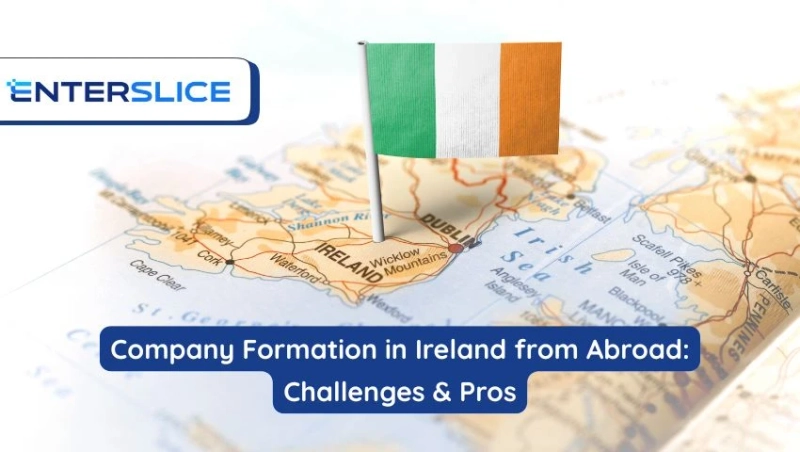Ireland has become a sought-after destination for entrepreneurs and businesses looking to establish a presence in Europe. With its competitive tax structure, access to the European Union, and business-friendly regulatory environment, Ireland presents a compelling proposition for foreign investors. However, setting up a company in Ireland from abroad comes with its own set of challenges and considerations.
This article explores both the advantages and the potential hurdles of company registration in Ireland while residing outside the country.
Why Ireland Appeals to International Entrepreneurs
Ireland has developed a reputation as a prime location for international business, particularly in the technology, pharmaceutical, and financial sectors. Several major multinational corporations have established their European headquarters in Ireland, attracted by a mix of strategic and regulatory incentives.
Among the reasons that make Ireland attractive to foreign entrepreneurs include:
- Corporate tax rate: One of the lowest in the EU, currently at 12.5% for trading income.
- EU membership: Seamless access to the European market and compliance with EU trade regulations.
- Skilled workforce: A well-educated, English-speaking labor pool.
- Legal system: Based on common law, providing familiarity for businesses from countries like the UK, US, Canada, and Australia.
- Supportive ecosystem: Numerous government initiatives and agencies such as Enterprise Ireland offer funding and guidance to startups.
These factors collectively enhance the appeal of Ireland as a gateway for international businesses looking to enter the European market.
Legal Framework and Registration Process
Setting up a company in Ireland while living abroad is legally permissible, and the process can be completed remotely with the right professional support. The Companies Registration Office (CRO) is the central authority responsible for company incorporation in Ireland.
To register a private limited company (LTD), which is the most common structure, the following key components are required:
- At least one director, who can reside outside Ireland.
- A separate company secretary (if there is only one director).
- A registered office address in Ireland.
- A company constitution.
- Shareholder information and issued share capital.
Although directors and shareholders can be non-residents, having a registered office in Ireland is mandatory. Many international founders rely on service providers who offer virtual office solutions, company secretary services, and registered addresses to meet legal obligations.
Also Read: Prerequisites for SARL Registration in France
Challenges of Setting Up a Company from Abroad
Despite Ireland’s openness to foreign business, establishing a company remotely is not without its difficulties. Entrepreneurs should be aware of the following challenges:
1. Local Requirements and Compliance
Even though the business can be run from abroad, the company must meet certain local requirements. These include appointing an EEA-resident director or obtaining a Section 137 bond if all directors are non-residents of the European Economic Area. This bond serves as a financial guarantee for compliance with tax and company law obligations.
2. Opening a Bank Account
Opening a business bank account in Ireland is often cited as one of the most difficult steps for foreign founders. Irish banks typically require in-person meetings and enhanced due diligence is common. While some fintech alternatives exist, they may not be suitable for all types of businesses or accepted by all partners.
3. Administrative Burden
Running a company from abroad adds a layer of complexity to administrative tasks such as tax filings, accounting, and statutory reporting. Engaging a local accountant or company formation agent is usually necessary to ensure compliance and timely submissions to authorities like Revenue and the CRO.
4. Tax Residency and Double Taxation
Determining tax residency is crucial. A company may be considered tax-resident in Ireland if it is centrally managed and controlled from Ireland, regardless of where the directors reside. Conversely, companies may risk being considered tax-resident in the home country of the directors, which can lead to double taxation. Understanding bilateral tax treaties and consulting with tax advisors is advisable to avoid pitfalls.
5. Cultural and Operational Distance
Remote operations come with inherent challenges such as time zone differences, limited face-to-face networking, and less engagement with the local business ecosystem. These factors can hinder growth, especially in the early stages when building relationships with suppliers, customers, or investors.
Read: Timeline for France Company Registration for Foreigners
Benefits of Incorporating in Ireland Remotely
While there are obstacles, the benefits of company formation in Ireland from abroad are substantial and often outweigh the challenges for committed entrepreneurs.
1. Credibility and Access to Markets
An Irish company enjoys a strong reputation internationally, particularly in Europe. This opens doors to clients, partners, and investors across the EU and beyond. The ability to issue invoices in euros and comply with EU VAT and regulatory standards adds to business credibility.
2. Tax Advantages
Ireland’s low corporate tax rate and the availability of reliefs such as the R&D tax credit, Knowledge Development Box, and capital allowances make it attractive from a financial standpoint. For holding companies, Ireland’s participation exemption and extensive tax treaty network reduce withholding taxes and enhance tax efficiency.
3. Access to Funding and Talent
Companies based in Ireland are eligible to apply for grants, funding, and mentorship from state agencies like Enterprise Ireland and Local Enterprise Offices. In addition, Ireland’s skilled workforce and open immigration policies support the recruitment of qualified employees and contractors.
4. Streamlined Company Formation Process
The Irish company formation process is relatively quick. Once all documentation is in order, registration can take as little as 3 to 5 working days. With the assistance of experienced formation agents, the entire process can be managed remotely without significant delays.
5. Flexibility of Company Structures
Ireland offers a range of company structures to suit different business needs, including private limited companies, designated activity companies (DACs), and branches of foreign companies. This flexibility allows founders to choose the structure that best aligns with their business model and future plans.
Strategic Considerations
When considering forming a company in Ireland from abroad, entrepreneurs should take a strategic approach:
- Engage legal and tax professionals early in the process to navigate international obligations.
- Plan for a physical presence if required, either through a virtual office, co-working space, or local representative.
- Consider the long-term implications of cross-border management, particularly about tax, data privacy, and employment law.
A well-structured Irish company can serve as a base for global expansion, providing regulatory certainty and operational advantages in a competitive European environment.
Conclusion
Forming a company in Ireland from abroad offers considerable benefits for international entrepreneurs, particularly those seeking access to the European market. While there are logistical and legal challenges to overcome, the process is manageable with proper planning and local support. By leveraging Ireland’s pro-business environment, favorable tax regime, and strong international reputation, foreign founders can build a successful and scalable operation from anywhere in the world.
Also Read: Documents Required for Company Registration in New Zealand
FAQs
1. Can I set up a company in Ireland without being an Irish resident?
Yes, non-residents can set up a company in Ireland. However, if none of the directors reside in the EEA, the company must obtain a Section 137 bond or appoint at least one EEA-resident director.
2. How long does it take to register a company in Ireland from abroad?
Once all documents are submitted correctly, the registration process typically takes 3 to 5 working days. Delays can occur if additional verification or documentation is required.
3. Do I need to visit Ireland to open a company bank account?
Most traditional Irish banks require an in-person meeting to open a business account. However, some digital banks and fintech solutions may offer remote account opening options, depending on the nature of the business and its structure.



